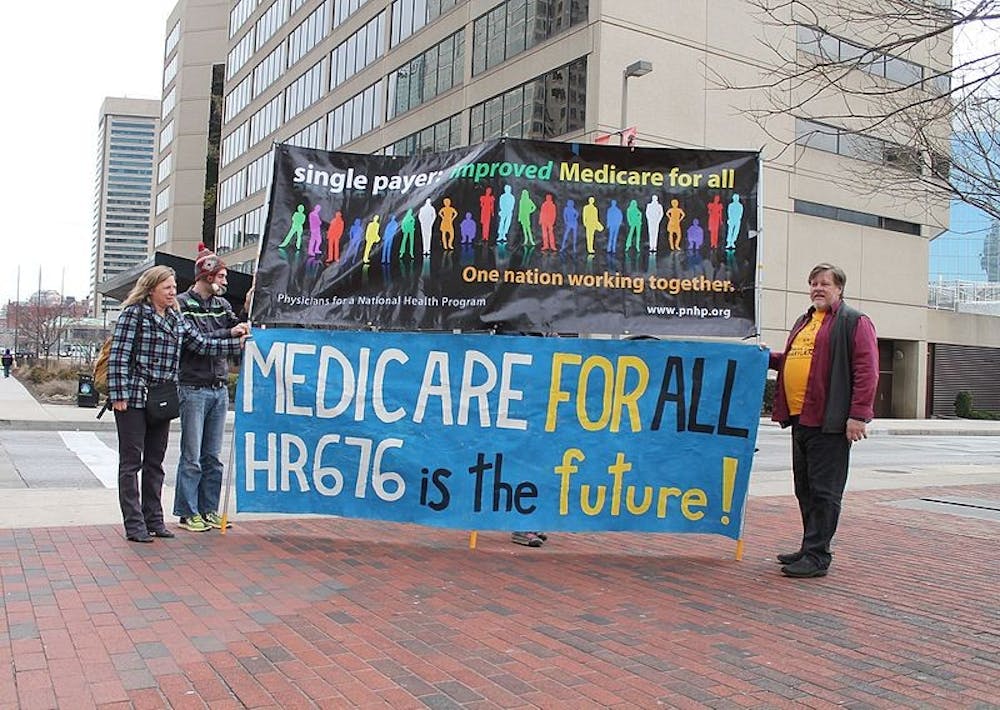One of the biggest criticisms of universal health care is its perceived inability to pass in the Senate. The idea behind this criticism is often that a more moderate plan would be able to go through, such as Medicare for All Who Want It, or even the expansion of Obamacare.
However, what this criticism fails to acknowledge is that our government very much operates on all-or-nothing fallacies. According to Alice Ollstein from Politico, this means that the health-care industry is going to mobilize against any and every bill that seeks to expand coverage.
Getting a public option or expanding Obamacare through the Senate is going to be just as difficult as getting Medicare for All to pass. There is no guarantee that a more moderate solution will be easier to enact than a bolder one.
My philosophy is this: When you go to buy a car worth $10,000, do you start off by asking for $10,000, or do you ask for $5,000 and see where it goes from there?
If you enter a situation already prepared to ameliorate and compromise before you’ve demanded or debated with the other party, you’re going to end up with a price that is mostly a disadvantage to you.
If a moderate solution is just as difficult to get through as a more audacious one, why not go for a plan that will save money in the long term and either cover or improve coverage for everybody in the country?
The issue of battling other interests in our government is far-reaching. Another piece by Politico highlights one example of this.
In 2019, when Congress was deciding on legislation that would make surprise billing harder by setting federal rates (a legislation with bipartisan agreement), a group called Doctor Patient Unity spent about $30 million on a campaign against the reform.
This ended up stalling the legislation from being brought to a vote. While Doctor Patient Unity claimed to favor arbitration between independent parties rather than government-set rates, other voices, like the Coalition Against Surprise Medical Billing, claimed that setting federal rates was the only way to ensure low health-care costs.
With such powerful interests acting on our government, it’s difficult to not feel absolutely powerless. Among my friends, I have noticed a trend of disconnection and apathy towards politics. The political machine seems like a self-operating instrument, independent from the people it serves, except when it’s time to vote.
However, the result of our political engagement lies all around us. It lies in the civil rights movement, the women’s suffrage movement, and the LGBTQ rights movement. When we engage and stand together, the results are incredibly powerful. We cannot disengage now; if we disengage, nothing is going to change.
This past week, I interviewed Professor Hahrie Han from the Department of Political Science to gain more insight into how change can emerge from grassroots movements.
First, I wanted to know whether the tradition set by the various movements in the 20th century of reform through grassroots organization would continue into the 21st century, with health care and other problems our country is facing right now.
“Large scale social change has almost always had grassroots support behind it,” she said in an interview with The News-Letter. “It takes broad political support coming in line with a set of other political factors.”
My own thoughts on this perfect alignment is that it is not spontaneous. It takes work and organization. It takes getting people to care about the millions of Americans who need better health-care coverage enough to do something about it.
One of the biggest obstacles any type of health-care reform faces is the apathy and disengagement of the people who don’t want to deal with the pettiness of politics.
“A lot of people are turned off by politics these days — by the bickering and polarization. Getting people to recommit starts with getting them to imagine a new future is possible,” Han said.
Another obstacle is an inherent emotional resistance to change.
“Any effort that is trying to make political change will face the status quo bias. There is an ex ante probability that change will not happen,” Han said.
These obstacles will be difficult to reckon with, but political change has happened before and it will happen again.
“All change efforts start with the sense it’s never going to happen. It’s improbable at the outset,” Han said.
But it does happen eventually. I did wonder if change was something we needed to slowly build towards. In our current political situation there is a lot of inertia towards making big changes. However, there doesn’t seem to be a set rule for how fast political reform can be enacted.
“Change can be fast or slow. It depends on the political dynamics of the situation,” Han said.
Perhaps these dynamics are in the midst of changing. It may take a crisis to rally the political momentum needed to reform our broken health-care system. Unfortunately, there are a few on the horizon.
The first one is obvious: coronavirus. According to USA Today, coverage is everything when it comes to getting tested for COVID-19. Some people may have the cost of getting tested waived, but others (especially those without insurance) may have to pay. The cost of going to the hospital and getting tested may deter many Americans from being screened, which could aid the spread of the pandemic.
It is not clear whether our health infrastructure is prepared to handle a high influx of patients either, making the situation even more grave. Additionally, the Affordable Care Act (or Obamacare) is up for review in the U.S. Supreme Court this year.
Depending on their decision, coverage and provisions could be dramatically altered. The uncertain future of this act and the looming pandemic may be the threats that unite us for health-care reform.





